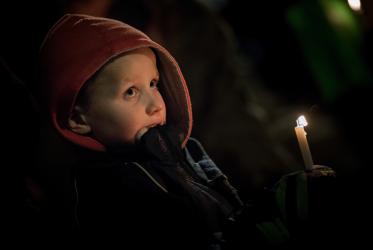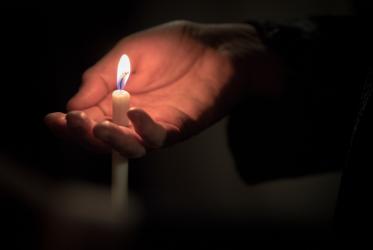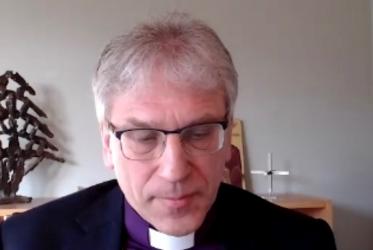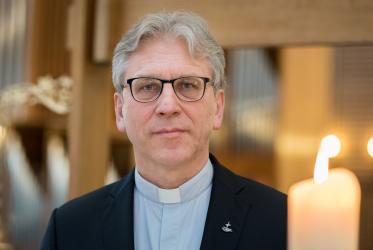World Council of Churches
CENTRAL COMMITTEE
Geneva, Switzerland
26 August - 3 September 2002
The Church of Norway and the Roma of Norway
Church of Norway is a Lutheran state church with 86 per cent of the Norwegian population as members. Church of Norway as such is not an independent legal entity. Only the municipal and congregational level of the Church of Norway has been considered as independent legal entities, and only since the new law of 1996. However, Church of Norway is considered to be non-governmental organization as well, active in both ecumenical, inter-religious and civil society fora. The General Synod is the highest body of the Church of Norway, and the lay people are also in majority in the three councils operating between the synods: Church of Norway National Council, Church of Norway Council on Ecumenical and International Relations and Sami Church Council.
The Roma people of Norway has a history of almost 500 years. The Gypsies (Vlach) came much later, around 1850. The former consists of approximately 5.000 - 20.000 (depending on how inclusive one counts) and the latter is approximately 300. Roma people used to travel and get their income from petty trade, handicrafts work and various forms of reparations. The Roma people have in short experienced three phases of state intervention:
· Forced segregation: End of 19th century: Legal to shoot Roma people, priests that gave baptism, confirmation, wedding or funeral to Roma people were in risk of loosing their job;
· Forced assimilation: Most of 20th century: Children were taken from their parents (1500 children out of a population of less than 10.000 were either brought up at other people’s homes or in institutions) laws were enacted to make it impossible for Roma to continue their traditional living and Roma were subject to forced sterilization, often without their knowledge.
· Respect of cultural heritage and status as a national minority in the last years of the last century. However, many Roma people would not be called a “minority” because they fear that this would cause further stigmatization.
The background
In 1997 the Rafto prize (human rights price in Bergen), was awarded to International Romani Union. At this occasion, the Commission on International Affairs congratulated with the prize and said that this event also challenged the Church of Norway to look into our own history of forced assimilation of Roma. A dialogue group was established, and during the spring of 1998 the dialogue started. The process was to prepare a text for the Synod in November, which focused on human dignity (euthanasia) and human rights as a commemoration of the 50 years anniversary of the Universal Declaration of Human Rights. It was also important is this early phase to have an understanding of the demands the Roma organizations had on the Norwegian Government and Parliament and on the Church.
The process leading up to the Synod was tense, and the media acknowledged the strong and explicit language that was used in the document for the Synod. The delegates seemed to face the gravity, and the sole responsibility of the Church of Norway for not voicing the concerns to – and not acting against the ill-treatment the Roma people had suffered through the history. However, there was an amendment in the last minute of the whole Synod, which was interpreted in such a way that it was understood that the Church of Norway wanted to share the responsibility with the population in general. This caused outrage and frustration, and many who had not been a part of the confidence building talks that had taken place, now could say with even stronger voices that “authorities, and especially the Church” could not be trusted. There was therefore a enormous challenge when the dialogue group, with more people both from the Church and from the Roma people sat down again just three weeks after the Synod.
The decisions from the 1998 Synod are the following:
1. The General Synod in Church of Norway has received a report from a long-term dialogue taken place between representatives from the Roma people and Church of Norway Council on Ecumenical Relations. We have met with representatives of this people, and listened to their thoughts and experiences. We are grateful for the dialogue that has taken place. We have learned much about violations in our country, and we see that we are also responsible in the attempts to extinguish thetehm as a people. Children were taken from their parents, women suffered from forced sterilization, people were named “insane” so that society could get rid of “troublemakers”, and practices equal to forced labour were used. It was all about changing the culture of a whole people. We have a sin and shame that we can not carry further.
Therefore we ask on behalf of our Church: Forgive us our sins!
2. The Synod asks the bishops to send a letter to all the congregations on this issue. This letter should contain information on what has happened, and that this is brought to the forefront at the Human Rights Sunday 1999, second Sunday of Advent. We propose:
a) An offering to the work of the organizations for the Roma people, in order to strengthen their culture and identity.
b) That the Commission on Liturgy under Church of Norway National Council formulates liturgical elements that help the parishes to ask for forgiveness for our common sin.
3. The Synod points to the fact that Norwegian authorities have a particular responsibility to give the Roma people restitution and restoration – as individuals and as a people. The Synod asks that Norwegian government and Parliament give priority to this work.
4. The Synod sees that reconciliation takes time, and asks that the ongoing dialogue must continue. The Synod asks that Church of Norway Council on Ecumenical and International Relations take the dialogue forward, and seek ways that the Church of Norway can contribute to reconciliation in the people, and support to the Roma people in their work on the government.
The first decision from the Committee, on the role of the Church, was slightly altered by a proposal from the Plenary. By this the General Synod (43 vs 40 votes) said that it was the general violations and not the specific violations done by Church people that was the basis for our prayer for forgiveness. This caused strong reactions, many of whom said that the Church by this decision “washed its hands” by blaming the general sentiments in the people, and not showing the sufficient will to pay the respect for the needs of the Roma people that had asked for a forgiveness of the Church of Norway.
The 2000 Synod
As it was considered unwise to present the issue once more in full, there was a work to ask one person or diocese to make a proposal for a new consideration of the role of the Church – presented at the 2000 Synod. This was done by referring to the wording in the annual report, and comment explicitly on this matter, with a separate decision. The Roma people were once again invited, and the Committee also had the opportunity to meet with professor Bjørn Hvinden.
The relationship between the Roma people and Church of Norway
The Committee will in particular direct attention to the Annual report’s description of the relationship between the Roma people and Church of Norway. A lot of work is done to present the culture of the Roma people and inform about their history. The Committee especially wants to pay attention to the recent research reports from “The Norwegian Research Council’s sub-programme on the Roma people (taterne)”.
Good experiences were made during the Human Rights Sunday in the congregations 1999 (5th of December), where many of the congregations through their confession of sins asked for forgiveness for our trespasses against the Roma people. This work must be continued, to build respect and develop new relations. The Committee have noticed that the General Synod 1998, struggling with the role of the Church of Norway in the violations against the Roma people, has not as intentioned healed the wounds that many of the Roma people carry with them. A reconciliation process imply that the violator let the victim define what is necessary for a real restitution.
Decision from the General Synod (unanimous):
With a reference to what the Committee has said on the chapter “Human rights, reconciliation and justice”, where also the relations between the Church of Norway and the Roma people are included, the General Synod wants to make the following statement:
- The General Synod 2000 asks the Roma people for pardon and forgiveness for the injustice and the violations that have been done from the Church of Norway against the Roma people.



